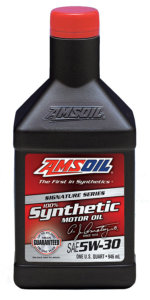
03 Jun The Industry has Low-Speed Pre-Ignition in its Sights
Today’s smaller, hotter-running engines pose significant challenges to lubricants. The latest is a phenomenon called low-speed pre-ignition (LSPI), which can destroy pistons and connecting rods.
What is LSPI?
As its name implies, LSPI is the spontaneous ignition of the fuel/air mixture prior to spark-triggered ignition. It’s another version of pre-ignition, which has been around since engines were invented. In this case, though, it occurs under low-speed, high-torque conditions in turbocharged gasoline-direct- injected (TGDI) engines and is much more destructive than typical pre-ignition.
In a direct-injected, four-stroke engine, the piston travels down the cylinder during the intake stroke. This is when the intake valve opens and allows air to charge the cylinder. During the compression stroke, fuel is injected, the valves close and the piston travels up the cylinder, squeezing the fuel/air
mixture in preparation for combustion.
In a properly operating engine, spark-triggered ignition typically occurs a few degrees before the piston reaches top dead center. This careful timing ensures the downward force of the exploding fuel/air mixture works in tandem with downward piston momentum, resulting in optimum engine efficiency and power.
LSPI effectively throws off engine timing. In turbocharged engines operating under certain conditions, particularly at low speeds and under high torque, like when taking off from a stoplight, the fuel/ air can spontaneously ignite too early in the combustion cycle. The expanding
combustion charge collides with the piston as it’s still moving up the cylinder. The collision between the exploding combustion charge and the upward moving piston can destroy the pistons or connecting rods.
What Causes LSPI?
Current thinking suggests the cause is due in part to oil/fuel droplets or particles in the cylinder auto-igniting randomly. The droplets/particles heat enough to ignite the air/fuel mixture before the spark plug ignites. This means oil formulation can play a role in reducing LSPI. Testing has shown that certain motor oil components can promote LSPI, while others can help quench it, such as zinc dialkyl dithiophosphate (ZDDP). Naturally, it’s tempting to think, “Well, dump a bunch of ZDDP into your formulations.” But ZDDP has been severely limited over the years in motor oil formulations since it’s been shown to have a negative effect on catalytic converters. Calcium, too, has been shown to affect LSPI, while PAO base oils have been show to help reduce LSPI. Even the formulation of gasoline plays a role; however, it’s easier to solve the problem by reformulating motor oil.
So you can see the balancing act confronting oil formulators. It’s no easy task figuring out how to formulate a motor oil that delivers excellent wear protection, resists the increased heat of turbocharged engines, prevents deposits, acts as a hydraulic fluid and, now, combats LSPI. Keep in mind that the performance of the total formulation is what counts.
New Performance Specs Coming
Difficult or not, fighting LSPI must be done. Next-generation oils will need to pass an LSPI test to meet the new API SP and ILSAC GF-6 performance specifications set to take effect in mid-2019. General Motors* is ahead of the game and requires oils to pass its own LSPI test to meet its updated GM* dexos1* specification (known as dexos1:2015) scheduled to take effect Aug. 31, 2017.
For now, you don’t have to worry too much. Your vehicle’s computer is programmed to avoid operating conditions that lead to LSPI. However, operating your engine under those conditions does promise fuel economy gains, so once oils hit the market that combat LSPI, you can bet the vehicle
manufacturers will program their vehicles to benefit from those efficiency gains.
We’ve been hard at work reformulating Signature Series Synthetic Motor Oil, XL Synthetic Motor Oil and OE Synthetic Motor Oil in preparation for the new engine challenges addressed by the new specifications.
The early signs are exciting. Signature Series aced the new LSPI test while improving performance in other areas as well.
You recently saw significant changes to our diesel oils. Expect more changes to our gasoline motor oils this year. We’ll have more information in the months ahead.

